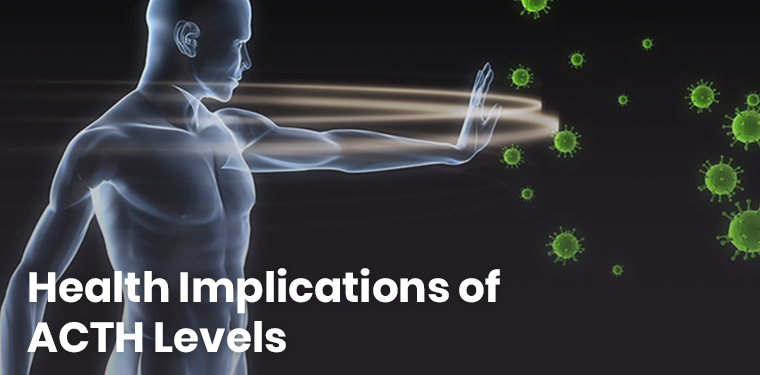
ACTH stimulates the release of cortisol, a stress hormone. Learn what causes ACTH to rise & fall and how it’s tested.
What Is ACTH?
Adrenocorticotropic hormone (ACTH), also known as corticotropin, is a hormone secreted by the pituitary gland. ACTH is responsible for stimulating the production of cortisol by the adrenal gland [1].
Cortisol is often produced in response to biological stress and has several important effects, including suppressing the immune response, maintaining blood pressure, and regulating protein, glucose, and lipid (fat) metabolism [1].
ACTH is regulated by corticotropin-releasing hormone (CRH), which is produced by the hypothalamus [1].
ACTH Test
The ACTH test measures the amount of ACTH in the blood. This test is often performed alongside a cortisol test to help identify problems with the adrenal glands or pituitary glands.
More specifically, the ACTH test (and a cortisol test) are used to help diagnose [2, 3]:
- Cushing’s syndrome (when the adrenal glands produce too much cortisol)
- Cushing’s disease (when the adrenal glands produce too much ACTH)
- Addison disease (when the adrenal gland does not produce enough cortisol)
- Adrenal and pituitary tumors
ACTH levels can vary throughout the day, so blood tests are typically performed in the morning when levels are highest. A doctor may request that the patient fast overnight before the test.
Normal Range
Normal ranges can vary between laboratories due to differences in equipment, techniques, and chemicals used. If your results are outside of the normal range, it may not necessarily mean there is something wrong. However, a normal result also doesn’t mean a particular medical condition is absent. Always talk with your doctor to learn more about your test results.
Interpretation of ACTH test results is often very complex. Diagnosis requires comparing the levels of both ACTH and cortisol. However, the levels of these two hormones can vary throughout the day [4].
Generally speaking, the normal range of ACTH in adults is about 6 to 76 pg/ml.
Low ACTH
Causes
A number of factors may cause a low ACTH result. Test results should be interpreted by a doctor who can take into account your medical history and other test results.
Low ACTH levels may be caused by secondary adrenal insufficiency. In this condition, impairment of the pituitary gland or hypothalamus leads to decreased production of ACTH. Causes of secondary adrenal insufficiency include [5, 6, 7, 8]:
- Hypopituitarism (pituitary insufficiency)
- Tumors in the pituitary gland
- Pituitary surgery or radiotherapy
- Damage/trauma to the pituitary gland
- Sepsis
Low ACTH can also be caused by tertiary adrenal insufficiency. This condition occurs when the hypothalamus gland doesn’t produce enough corticotropin-releasing hormone (CRH), which is the hormone that stimulates the release of ACTH. Causes of tertiary adrenal insufficiency include [R, R]:
- Tumors in the hypothalamus
- Hypothalamus surgery or irradiation for tumors
- Infections of the hypothalamus
- Injury or trauma to the hypothalamus
Some drugs may also cause low ACTH levels, including:
- Corticosteroids, including prednisone, dexamethasone, prednisolone, methylprednisolone, and megestrol acetate [9, 5, 10]
- Opioids [11, 12]
- Nivolumab (Opdivo) (an anti-cancer drug) [13]
- Antipsychotics including olanzapine (Zyprexa) and quetiapine (Seroquel) [14]
- Mirtazapine (Remeron), an antidepressant [15]
Low ACTH Effects
Low ACTH levels may cause:
- Low sodium levels (hyponatremia) [16]
- Low blood bicarbonate [17]
- High calcium levels (hypercalcemia) [12]
- Hypothyroidism [18]
Low ACTH Symptoms
Symptoms of secondary and tertiary adrenal insufficiency and hypopituitarism may include:
- Nausea and vomiting [19]
- Fatigue [19]
- Lack of appetite [16]
- Low blood sugar [20]
- Muscle weakness [19]
- Depression [16]
High ACTH
A number of factors may cause a high ACTH result. Test results should be interpreted by a doctor who can take into account your medical history and other test results.
Causes
Some causes of high ACTH levels include:
Some conditions that may cause high ACTH levels include:
- Cushing’s disease [23]
- Addison’s disease, which may be caused by [24]:
- Injuries to the adrenal gland
- Infections (sepsis, HIV, tuberculosis)
- Fungal infections
- Sarcoidosis and amyloidosis
- Inherited conditions (Wolman disease and adrenal leukodystrophy)
- ACTH-producing tumors [25]
Some drugs may also cause increases in ACTH levels:
- Levodopa (used to treat Parkinson’s disease) [26]
- Propranolol [27]
- Metoclopramide [28]
- Reboxetine (Edronax), an antidepressant [29]
Symptoms of High ACTH
Non-specific symptoms of high ACTH levels may include [23, 24]:
- Fatigue
- Weakness
- Depression
- Nausea and vomiting
- Dizziness
- Stomach and back pain
- Poor appetite
Symptoms of Cushing’s disease may include [23, 30]:
- Weight gain
- Delayed wound healing
- Excessive sweating (hyperhidrosis)
- Easy bruising
- Decreased libido
- Fatigue
- Swelling
- Male-pattern hair growth in women (hirsutism)
- Irregular menstrual cycle
- Erectile dysfunction
- Fat deposits in the upper body
- Purplish lines on the body
Symptoms of Addison’s disease may include [24]:
- Weight loss
- Low blood pressure
- Abnormally fast heart rate
- Patches of dark skin (hyperpigmentation)
ACTH Genes and SNPs
ACTH levels and function may be influenced by variations in the following genes:

